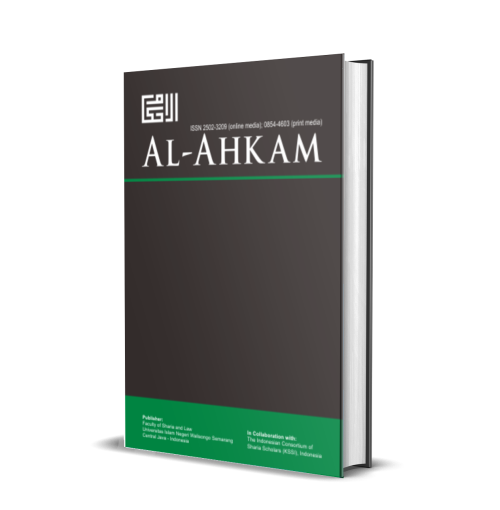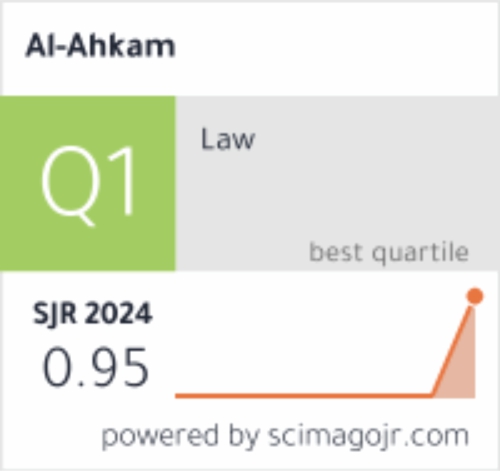Legal Effectiveness of Halal Product Certification in Improving Business Economics in Indonesia and Malaysia
DOI:
https://doi.org/10.21580/ahkam.2024.34.1.20546Keywords:
business actors, halal, halal certificationAbstract
Law Number 33 of 2014 and Government Regulation Number 31 of 2019 in Indonesia shifted halal certification from voluntary to mandatory on October 17, 2019, contrasting with Malaysia's voluntary system under the 2011 Akta Perihal Dagang (APD). This study aims to scrutinize the legal regulations of halal certification in both countries and assess their impacts on business entities. Employing a qualitative method with a phenomenological approach reveals differences in certification procedures, notably in application-to-issuance stages. Indonesia provides a self-declaration mechanism for micro and small businesses, while Malaysia lacks such a provision. Nonetheless, material inspection principles align in both nations. Most respondents perceive halal certification as crucial for sales turnover, despite challenges posed by the COVID-19 pandemic. This research is significant for businesses and governments on how to manage halal certification in both countries.
Downloads
References
Agus, Panji Adam. ‘Kedudukan Sertifikasi Halal dalam Sistem Hukum Nasional sebagai Upaya Perlindungan Konsumen dalam Hukum Islam’. Amwaluna: Jurnal Ekonomi dan Keuangan Syariah 1, no. 1 (2017): 150–65. https://doi.org/10.29313/amwaluna.v1i1.2172.
Aminuddin, Muh. Zumar. ‘Sertifikasi Produk Halal: Studi Perbandingan Indonesia dan Thailand’. Shahih: Journal of Islamicate Multidisciplinary 1, no. 1 (2016): 27–39. https://doi.org/10.22515/shahih.v1i1.52.
Amrullah, Kamsari. Mekanisme Pengajuan Sertifikasi Halal dan Fasilitasi Halal bagi UMK. Jakarta: BPJPH Kementerian Agama, 2022.
Deuraseh, Nurdeng, and Nurulhuda Asilah Asli. ‘Issues on Halal Foods with Special Reference to Fatwa on Halal Pet Food for Cats in Islamic Law’. el-Mashlahah 12, no. 2 (2022): 103–23. https://doi.org/10.23971/elma.v12i2.3534.
Dharmawati, Made. Kewirausahaan. Depok: Rajawali Pers, 2016.
Farhan. ‘Pelaksanaan Sertifikasi Halal LPPOM MUI terhadap Produk Usaha Mikro, Kecil dan Menengah (UMKM) (Studi LPPOM MUI Provinsi Bengkulu)’. Jurnal Manhaj 3, no. 1 (2018): 2. https://doi.org/10.29300/mjppm.v3i1.2340.
Faridah, Hayyun Durrotul. ‘Sertifikasi Halal di Indonesia: Sejarah, Perkembangan, dan Implementasi’. Journal of Halal Product and Research 2, no. 2 (2019): 72. https://doi.org/10.20473.
Friedman, Lawrence M. Sistem Hukum: Perspektif Ilmu Sosial. Edited by Nurainun Mangunsong. Translated by M. Khozim. Bandung: Nusa Media, 2015.
Gibson, James L, John M. Ivancevich, and James H. Donnely. Organisasi dan Manajemen: Perilaku, Struktur, Proses. Translated by Djorban Wahid. Jakarta: Erlangga, 1994.
Ginting, F. Manajemen Pemasaran. Bandung: Yirama Widya, 2011.
Hasan, KN. Sofyan. ‘Pengawasan dan Penegakan Hukum terhadap Sertifikasi dan Labelisasi Halal Produk Pangan’. Jurnal Hukum Ius Quia Iustum 22, no. 2 (2015): 290–307. https://doi.org/10.20885/iustum.vol22.iss2.art7.
Hatoli, Hatoli. ‘Sertifikasi Halal Majelis Ulama Indonesia pada Produk Elektronik dan Non Konsumsi Perspektif Maslahah’. JIL: Journal of Islamic Law 1, no. 2 (2020): 237–55. https://doi.org/10.24260/jil.v1i2.45.
Hidayat, Asep Syarifuddin, and Mustolih Siradj. ‘Sertifikasi Halal dan Sertifikasi Non Halal Pada Produk Pangan Industri’. Ahkam: Jurnal Ilmu Syariah 15, no. 2 (2015): 199–210. https://doi.org/10.15408/ajis.v15i2.2864.
Hidayati, Tri, Muhammad Syarif Hidayatullah, Parman Komarudin, and Atika Atika. ‘Digitalization of Islamic Finance: Epistemological Study of the National Sharia Board-Indonesian Council of Ulama’s Fatwa’. al-Ahkam 33, no. 2 (2023): 255–78. https://doi.org/10.21580/ahkam.2023.33.2.17324.
Jahar, Asep Saepudin, and Thalhah Thalhah. ‘Dinamika Sosial Politik Pembentukan Undang-Undang Jaminan Produk Halal’. al-Ihkam: Jurnal Hukum & Pranata Sosial 12, no. 2 (2018): 385–404. https://doi.org/10.19105/al-ihkam.v12i2.1232.
Julyano, Mario, and Aditya Yuli Sulistyawan. ‘Pemahaman terhadap Asas Kepastian Hukum melalui Konstruksi Penalaran Positivisme Hukum’. Jurnal Crepido: Jurnal Mengenai Dasar-Dasar Pemikiran Hukum Filsafat dan Ilmu Hukum 1, no. 1 (2019): 13–22. https://doi.org/10.14710/crepido.1.1.13-22.
Kriyantono, Rachmat. Teknik Praktis Riset Komunikasi. Jakarta: Prenada Media, 2014.
Mohammad, Mutiara Fajrin Maulidya. ‘Pengaturan Sertifikasi Jaminan Produk Halal di Indonesia’. Kertha Wicaksana 15, no. 2 (2021): 149–57. https://doi.org/10.22225/kw.15.2.2021.149-157.
Muhamad, Muhamad. ‘Tantangan dan Peluang Penerapan Kebijakan Mandatory Sertifikasi Halal (Studi Implementasi UU No. 33 Th. 2014 dan PP No. 31 Th. 2019)’. Jurnal Ilmu Ekonomi dan Bisnis Islam 2, no. 2 (2020): 1–26. https://doi.org/10.24239/jiebi.v2i2.29.1-26.
Pakpahan, Aknolt Kristian. ‘COVID-19 dan Implikasi bagi Usaha Mikro, Kecil, dan Menengah’. Jurnal Ilmiah Hubungan Internasional 16, no. 1 (2020): 59–64. https://doi.org/10.26593/jihi.v0i0.3870.59-64.
Purwanto, Hery, Sumunar Jati, and Ahmad Rofiq. ‘Policy Analysis of Enforcement of Halal Product Guarantee Regulations through the Regulatory Impact Analysis (RIA) Approach’. Journal of Digital Marketing and Halal Industry 3, no. 2 (2021): 149–64. https://doi.org/10.21580/jdmhi.2021.3.2.9345.
Ramlan, Ramlan, and Nahrowi Nahrowi. ‘Sertifikasi Halal sebagai Penerapan Etika Bisnis Islami dalam Upaya Perlindungan bagi Konsumen Muslim’. Ahkam: Jurnal Ilmu Syariah 17, no. 1 (2014): 145–54. https://doi.org/10.15408/ajis.v17i1.1251.
Robbins, Stephen P. Teori Organisasi: Struktur, Desain dan Aplikasi. Translated by Jusuf Udaya. Jakarta: Arcan, 1994.
Rosnan, Herwina, Ismah Osman, Norzanah Mat Nor, and Amelia Aminuddin. ‘Halal Certification: An Exploratory Study on Non-Certified Restaurants’. Advanced Science Letters 21, no. 6 (2015): 1854–57. https://doi.org/10.1166/asl.2015.6136.
Sari, Meivi Kartika, and Eny Sulistyowati. ‘Kesadaran Hukum Pelaku Usaha Mikro Kecil Menengah Berkaitan Kepemilikan Sertifikat Halal Pada Produk Olahan Pangan’. Novum: Jurnal Hukum 7, no. 1 (2020): 35–42. https://ejournal.unesa.ac.id/index.php/novum/article/view/31103.
Steers, Richard M. Efektivitas Organisasi. Translated by Magdalena Jamin. Jakarta: Erlangga, 1985.
Suparto, Susilowati, D. Djanuardi, Deviana Yuanitasari, and Agus Suwandono. ‘Harmonisasi dan Sinkronisasi Pengaturan Kelembagaan Sertifikasi Halal Terkait Perlindungan Konsumen Muslim Indonesia’. Mimbar Hukum 28, no. 3 (2016): 427–38. https://doi.org/10.22146/jmh.16674.
Sutopo, Ariesto Hadi, and Adrianus Arief. Terampil Mengolah Data Kualitatif Dengan NVIVO. Jakarta: Prenadamedia Group, 2016.
Thaha, Abdurrahman Firdaus. ‘Dampak COVID-19 terhadap UMKM di Indonesia’. Jurnal Brand 2, no. 2 (2020): 147–53. https://ejournals.umma.ac.id/index.php/brand/article/view/607.
Warto, Warto, and Samsuri Samsuri. ‘Sertifikasi Halal dan Implikasinya bagi Bisnis Produk Halal di Indonesia’. Al Maal: Journal of Islamic Economics and Banking 2, no. 1 (2020): 98–112. https://doi.org/10.31000/almaal.v2i1.2803.
Yunus, Nur Rohim, and Annissa Rezki. ‘Kebijakan Pemberlakuan Lock Down sebagai Antisipasi Penyebaran Corona Virus COVID-19’. Salam: Jurnal Sosial dan Budaya Syar’i 7, no. 3 (2020): 227–38. https://doi.org/10.15408/sjsbs.v7i3.15083.
Downloads
Published
How to Cite
Issue
Section
License
By submitting an article to the journal, the author(s) agree to transfer the published article's copyright to the journal, which will act as the publisher. This means the journal will have the right to publish the article in various forms, including reprints. The journal will maintain the publishing rights to the published articles.
In line with the license, authors and third parties (readers, researchers, and others) are allowed to share and adapt the material. In addition, the material must be given appropriate credit, provided with a link to the license, and indicated if changes were made. If authors remix, transform or build upon the material, authors must distribute their contributions under the same license as the original.



